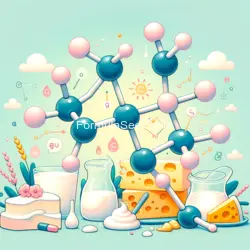
Understanding Lactose in Infant Formula
What is Lactose?
Lactose is a natural sugar found in milk and dairy products. Chemically, it's a disaccharide, meaning it's composed of two smaller sugar molecules, glucose and galactose. It's not just a source of energy; lactose plays several crucial roles, particularly in infant nutrition.
The Role of Lactose in Breast Milk
Lactose is the primary carbohydrate in human breast milk, comprising around 7% of its composition. This high lactose content is not an accident; it serves several vital functions for a developing infant:
Energy Source: Lactose is a significant energy provider, crucial for the rapid growth and development in the early stages of life.
Enhances Calcium Absorption: Lactose increases the absorption of calcium, an essential mineral for the development of strong bones and teeth.
Gut Health: It promotes the growth of beneficial gut bacteria like bifidobacteria, which aid in digestion and protect against harmful bacteria.
Brain Development: The galactose component of lactose is critical for brain and nervous system development.
Lactose in Infant Formula
Infant formulas are designed to mimic the nutritional profile of human breast milk as closely as possible. Since lactose is a major component of breast milk, it naturally becomes a key ingredient in most infant formulas.
Why Add Lactose to Infant Formula?
Mimicking Breast Milk: To provide a balance of nutrients similar to breast milk, including lactose is crucial.
Digestive Health: Lactose supports a healthy balance of gut flora, which is vital for infants, especially in their early development.
Nutritional Needs: It meets the specific energy and nutritional needs of infants, which are different from older children and adults.
Lactose Intolerance and Formula
Some infants might be lactose intolerant, meaning they have difficulty digesting lactose. This is rare in newborns but can occur. For these infants, lactose-free formulas are available. These formulas use different carbohydrates, like corn syrup solids, to provide the necessary energy and support growth.
Conclusion
Lactose is not just a sweetener but a vital component in infant nutrition. Its presence in infant formula is a testament to our understanding of the nutritional needs of infants and the importance of mimicking breast milk as closely as possible. While most infants thrive on lactose-containing formulas, alternatives exist for those with specific dietary needs like lactose intolerance. As always, if there are concerns about an infant's diet or health, consulting a healthcare professional is essential.



